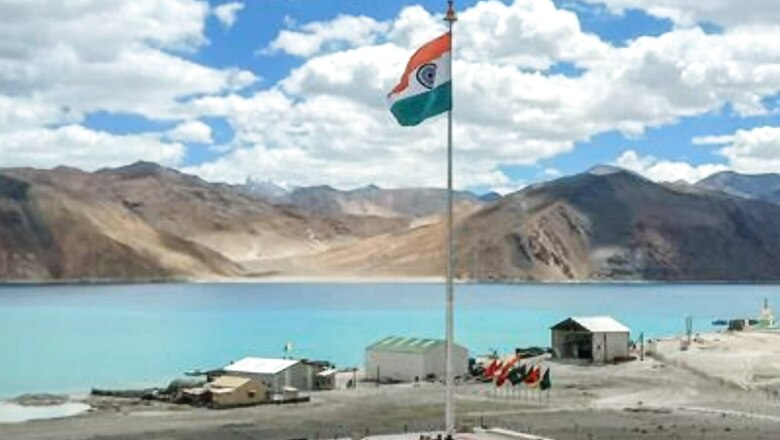
views
On 5 August 2019, the government moved a historic resolution in Parliament, which announced the revocation of most of the clauses of Article 370. The article had impeded the progress in the state by preventing investment by corporate entities. The announcement also divided the state into two union territories, thereby unshackling the growth potential of Ladakh, whose growth potential had been stymied by its linkages with Jammu and Kashmir.
Since then, Ladakh has undergone a transformation in the last three years. The Union Territory has been able to transform itself from being part of a terrorism infested political entity to a role model of sustainable development. In the last three years Ladakh has been connected to the national grid, which has kickstarted winter tourism and has boosted the economy tremendously. New educational institutions have been set up and Ladakh, which hardly had any institutions of higher learning, now has two universities and institutions of higher learning. The region is emerging as the hub of green energy in India. Not only is its enormous potential of wind and solar energy being harnessed. Pilot plants are being set up for Green Hydrogen. The first Hydrogen bus in India is also expected to ply in Ladakh soon. A 900-km-long power transmission link between Leh and Kaithal in Haryana, with 12 GWh battery energy-storage connectivity, is being created to harness the enormous green energy potential of the region. Ladakh is being developed as a Carbon neutral region. In addition, road connectivity to the sparsely inhabited region is being improved, the survey for rail connectivity has been completed and new airports are being set up. Many corporate houses are waiting for clearances to invest in tourism, power, IT and infrastructure sectors.
Similarly, in Jammu and Kashmir, which has borne the brunt of cross border terrorism for last few decades, the transformation has resulted in all round development. With the implementation of all the Central laws in J&K, not only, has the infrastructural development sky rocketed, but more significantly there has been considerable improvement in the Law and Order situation, despite repeated attempts by Pakistan to push in terrorists from across the Line of Control. A comparison of statistics of 1000 days before and after 5 August 2019 clearly indicates that terror incidents have reduced by 32 per cent, whereas fatalities of security personnel have more than halved. Even the recruitment of terrorists, despite the huge psychological boost received by them after the fall of Kabul to Taliban, has reduced by 14 per cent.
More significantly, for the first time, the norms of social justice prevailing in the rest of India have been implemented in the territory. Consequently, the women, who were earlier discriminated against, if they married outside the state, now have equal property rights as men; In the same vein, affirmative action for scheduled tribes has been implemented in the territory. Thousands of Kashmiri Pandits have been resettled and provided employment. The displaced people from Pakistan occupied Jammu and Kashmir have been provided financial grants. The refugees from West Pakistan, who had migrated to Jammu & Kashmir and were hitherto not entitled to vote for the local elections or seek employment; have been provided financial assistance and full citizenship rights. Similarly, the sanitation workers brought to the State in 1953, and their children, who were not permitted to go to schools locally and consigned to work as sanitation workers only, have been given a new lease of life. They are now free to
choose a profession and live with equal opportunity as others in J&K.
Even the Panchayati Raj institutions, which existed only in name in J&K, have been strengthened by liberal financial grants and enactment of Jammu and Kashmir Panchayati Raj Act on 21 October 2020. A third tier of local administration, namely, district development councils has been created and with this all three tiers of grass root level democracy have been established in J&K for the first time since independence. There is great enthusiasm for these institutions, which has been reflected in the overwhelming voter turnout for the local body elections. These processes to usher in grassroots level democracy have helped to break the monopoly of few families over political power.
In the economic domain, the government has undertaken numerous projects during the last three years, but more significantly, Jammu and Kashmir has received investment applications of more than Rs 56,000 crores from private entities, whereas since independence the state has received only Rs 14,000 crore as private investment. It is expected that these investments in varied sectors like, tourism, health, automobile, steel fabrication, recreation, warehousing, and others will create job opportunities for over two lakh persons in Jammu and Kashmir. New roads are being constructed, tunnels are being built to ensure round the year connectivity of all the regions. Work is progressing fast on Katra-Banihal section of the rail link to Kashmir Valley. Tourists are thronging the region in ever increasing numbers.
There are, however, things that still need to be done. The territory especially Kishtwar and Bhaderwah need to be connected to Himachal Pradesh with all-weather roads. Connectivity between Zanskar Valley in Ladakh and Kishtwar needs to be established. Similarly, both Ladakh as well as Jammu and Kashmir need new urban centres, so that pressure on existing urban centres is eased. The monopoly of Jammu and Srinagar over allocation of new infrastructure projects needs to be broken. It is time that the archaic system of transferring capital from Jammu to Srinagar and back, should be done away with and a new capital like Canberra should be established. Despite traversing the pathways of growth under the LG’s administration, the elections to the assembly after delimitation should be undertaken as soon as possible, so that people’s representatives can start administering the region themselves.
The gigantic step taken by the government on 5 August, three years ago, has transformed the region and has led to all-round development in both Ladakh and J&K. It is essential that the progress must be continued so as to usher in economic prosperity and greater integration with the rest of India.
Alok Bansal is Director, India Foundation. The views expressed are personal.
Read the Latest News and Breaking News here

















Comments
0 comment